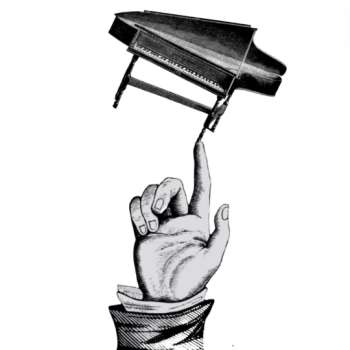Editor's Note: This article is part of the symposium, "What Is Progressive Christianity?" presented by the newly launched Patheos Progressive Christian Portal and in partnership with the Wild Goose Festival (June 23-26). Like us on Facebook to receive today's best commentary on Progressive Christianity.
I grew up Fundamentalist. Whatever criticisms you might offer of people from my tribe, at least this could be said of us: we knew our place in the universe. We were in a cosmic battle between God's forces of light and Satan's forces of darkness. We were knights of the gospel, warriors for truth, fighters for doctrinal fundamentals and personal purity.
And our nemesis—on the side of darkness, the devil, damnation, and delusion—were the liberals. I'm not surprised that many conservatives still see the world in the same binary ways they did in the 1950s. Dualistic seeing becomes a deeply ingrained habit, so that anything that isn't conservative ("like us") is, by default, liberal. That's why I think those of us who are using the term "progressive Christian" have some extra explaining to do to our conservative brothers and sisters. And even before that, we have some listening to do. We need to understand from them what they think "liberalism" means, and then we have to explain how "progressive" is different.
When I try to re-enter the mindset of my younger years, here's what I think "liberal" means to my fellow Fundamentalists, Evangelicals, Charismatics, and conservative Catholics:
- Liberalism is lax. Liberals have no passion. They're sometimes nice. They're usually moderate. They're often boring. But they're never firm and fired up and willing to stand up, be counted, and even suffer for what they believe.
- Liberalism is lazy. Liberals have no backbone. A liberal has never met a capitulation he doesn't like. That's why liberals capitulated to Darwin on evolution (we won't mention Galileo before him), and then on divorce and feminism, and then on homosexuality. Give them some time and they'll capitulate on atheism and motherhood too. This laziness erodes their identity and leads straight from neo-orthodoxy to nominalism to agnosticism to atheism.
- Liberalism is fuzzy and flimsy. Liberals don't know what they believe. Everything for them is nuanced and complexified to the point of being incomprehensible and incommunicable. They walk around in a theological fog and if you walk with them, you'll be in it too.
- Liberalism is proud. Even though they're lax, lazy, fuzzy, and flimsy, liberals think they're better than us—more educated, smarter, richer, more high-class, more politically powerful. They're snobs, always putting us down.
- Liberalism is dying. When you're lax, lazy, fuzzy, flimsy, and proud, what motivation do you have to evangelize, to expand, to create, to celebrate? Without that motivation, liberals just sit back on their institutional assets and look down on the rest of us—who are passionately committed, energetically expanding, clear on our essential beliefs and mission, and humble enough to work with common people with their messy problems.
Now my liberal friends might point out the flaws in this diagnosis, and they might defend liberalism as being far better than these crude conservative stereotypes. But however justified their self-defense might be, it will only lead to a fruitless argument. That's why I think it's far better to forego that argument and instead to prove—in actions first, then in words—that to be a progressive Christian means more than being lax, lazy, fuzzy, flimsy, proud, and dying.
In fact, the progressive Christians I know are highly committed, not lax. True, they don't measure fidelity in terms of "the five fundamentals of the faith," but they do take two fundamentals very seriously: "love God and love your neighbor." And it gets even more interesting when they extend "neighbor" to stranger, outsider, outcast, alien, and enemy. True, they aren't strict when it comes to drinking a beer or using some colorful vocabulary, but they can be downright puritanical when it comes to recycling and advocating for the environment. Talk to them about equal human rights for Palestinians or LGBTQ folks, or engage them on global poverty and pre-emptive war, and you'll see real passion.
And although they aren't rigid doctrinally, they aren't lazy either. They're still seeking for meaningful ways to express their faith, and when they find those ways, I think you'll see a lot more passionate progressive Christians rediscovering "the E-word"—Evangelism. No, it won't be, "Be a progressive Christian or you'll burn in hell forever." It will be more like, "Let's join God in the healing and liberation of God's community of creation." It will be, "I'm part of a faith community that's learning to live in the way of Jesus. You're welcome to be part of our journey together." Or "Why waste your life selfishly pursuing money and power and pleasure when you can join God in the healing of the world?"




